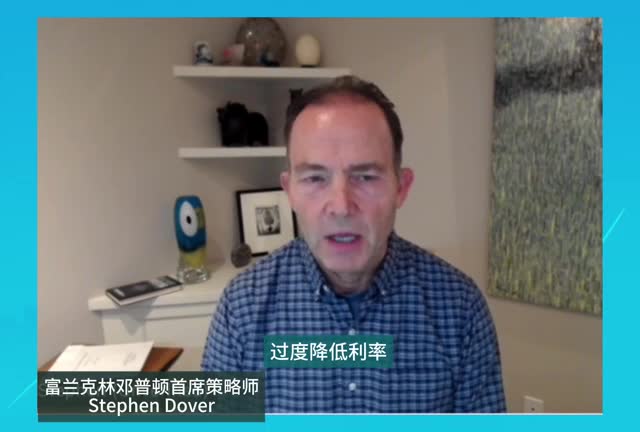
(Yicai) April 22 -- With the US dollar sinking to a three-year low, questions arise about whether the greenback will remain the world’s dominant currency or collapse. But even though the euro is popular, the dollar's reserve currency status remains hard to shake, according to Stephen Dover, chief market strategist at Franklin Templeton.
“There are those in [Trump’s] administration who think that the dollar being the reserve currency has actually been bad for the Unites States because the United States then doesn’t produce things,” Dover, who also heads the Franklin Templeton Institute, said in a recent interview with Yicai.
“I don't know if they would want the US dollar to be the reserve currency, but they'd like a pretty massive devaluation of the dollar and a restructuring of the foreign debt,” he said. “I don't think it's likely to happen, but it is something to consider in the direction that they would like to go.”
The US Dollar Index, a measure of the greenback's value relative to a basket of other currencies, fell to around 98.6 yesterday, the lowest level in three years. The Japanese yen and the euro have appreciated by 5 percent to 10 percent against the dollar since the start of this year.
The greenback had been overvalued by 10 percent to 20 percent, stemming from the US' superior asset return rates attracting global capital inflows over the past decade or more, according to Wall Street investment banks. However, the new steep import tariffs will hit US business profits and consumer pockets, undermining the core pillar of a strong dollar.
“Anybody who leads the United States economy could argue that the dollar is overvalued right now, and that the dollar could depreciate 10 percent, maybe even 15 or 20 percent, and still be the reserve currency of the world.” Dover pointed out.
“So strong dollar, meaning high dollar, and reserve currency, are kind of two different things. They’re related, but they’re two different [things],” he added.
Mar-a-Lago Accord
Weakening the dollar is a core idea of the so-called Mar-a-Lago Accord, a proposed economic policy to get other economies to agree to pump up their currencies and help devalue the dollar, with higher tariffs to protect US manufacturing and boost revenue also one of the themes.
The accord originated in the report -- A User's Guide to Restructuring the Global Trading System -- published last year by Stephen Miran, chairman of the White House Council of Economic Advisers.
The Harvard-graduated economist said that one of the core issues facing the US derives from the special status of the dollar as the world's primary reserve currency, leading to its long-term overvaluation, which has harmed the competitiveness of US manufacturing and exacerbated the trade deficit.
“It's troubling that Stephen Miran is the most senior economist in Trump's administration," Dover said. "We have to be careful because there are a lot of different camps, and it's unclear what Trump thinks. He's confusing when he talks about the dollar because he talks both about wanting a strong dollar and wanting it to be weaker, but he wants it to be the reserve currency.
"Remember, he threatened emerging countries that were looking to band together to have another currency," Dover pointed out.
“If I may go back to the retaliatory tariffs and those numbers, we knew they didn't make sense when they came out, but they were basically just based on the amount of the trade deficit," Dover said. "So what Trump is, in essence, saying is he does not want a trade deficit. That means that other countries could lower their tariffs to zero.
“I'm thinking of Vietnam, which doesn't have very high tariffs anyway, but it would still have a trade deficit with the United States," Dover said. "It doesn't make sense for Vietnam to have a really high currency and Vietnam's GDP is not large enough to purchase whatever in the US.
“So there’s a lot of very mixed and confused messages, and that's the real thing that's happening with our clients and with our investors," according to Dover.
Given that the Trump administration seems to want the dollar to weaken moderately to boost export competitiveness, the US will try to encourage yen appreciation in its negotiations with Japan, Dover pointed out.
Not a ‘MEGA Moment’
Many institutions are seeking ways to diversify risk, including gold and euro assets. In Dover’s view, the euro is popular, but the dollar’s status as a reserve currency is difficult to undermine.
“I don't think it's a MEGA (Make Europe Great Again) moment, but so the short answer is we're positive on Europe," Dover said. "The longer answer is that we have thought, and I've said for at least the last six months, we thought the market was going to broaden, that those Maga-7 companies were overvalued and there's more value in other parts of the market, including overseas.
"So let's go back to before Germany's fiscal expansion, Europe was just relatively cheap compared to the US, by the way, so is China," Dover noted. "So, just all things being equal, it makes sense that tactically, those countries would have a jump."
The standard theory of exchange rates holds that fiscal expansion will drive up the value of the domestic currency because it will bring stronger growth and higher real interest rates, Dover said, adding that the recent strengthening of the euro is in line with this logic.
The euro might have been even stronger if not for the European Central Bank's simultaneous monetary policy easing, according to Dover. With the US Federal Reserve expected to start a rate-cutting cycle later this year, the euro will likely further appreciate against the dollar, he added.
Editor: Martin Kadiev